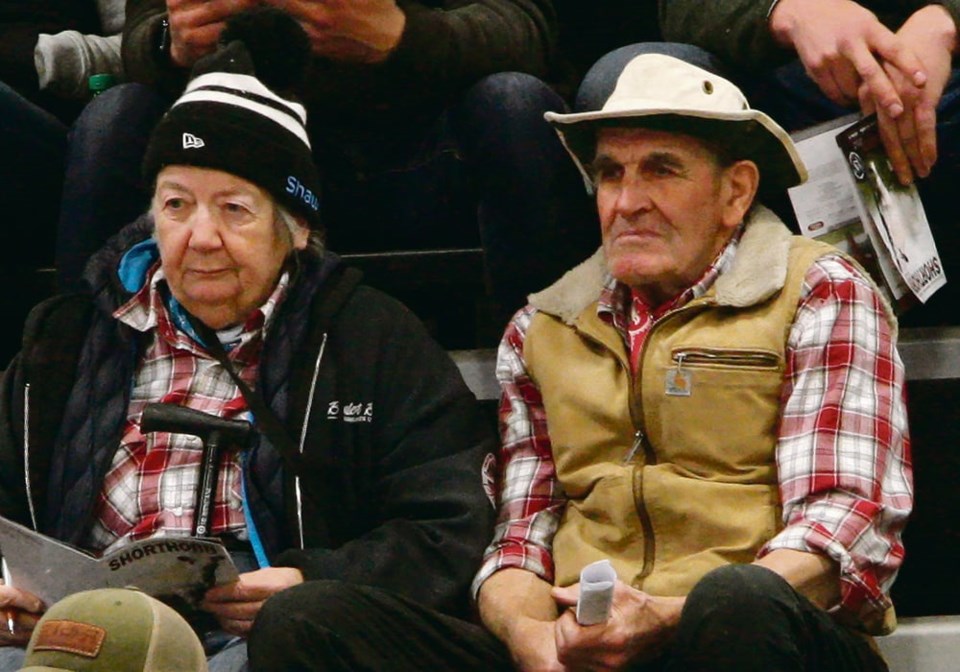REGINA — Many producers would have called it quits by their mid-80s but Bill Acheson was still bidding on cattle at Canadian Western Agribition last month as he neared his 85th birthday.
In fact, he and his wife, Isabel, bought the high-selling lot in the Shorthorn sale, spending $19,000 on a pick of the herd offered by SaskValley Stock Farm from Rosthern, Sask.
The Achesons operate Herbourne Shorthorns in Somerset, Man., where they run about 20 purebred cows. They’ve shown, and been highly successful, at Agribition since 1982.
Isabel Acheson said they bid on the herd pick because they liked the offspring from a herd sire they had bought from SaskValley.
“It’s just a well-respected herd and we are looking forward to picking out a good female,” she said. “It’s a cow-calf package potentially. They don’t calve until later in the spring and the choice has to be made by July 1.”
She also said SaskValley is an attractive option because the operation was among three buyers that purchased Herbourne’s famous Manitoba Sunrise bull about 40 years ago. The price was $7,000.
The family’s Agribition participation began with a feat few can likely boast. They entered four head in the 1982 event, all from one cow, Hewellen Riverhurst Lass 7J. According to an article from the Canadian Shorthorn Association, by the end of the show they had won grand champion bull, female, breeder’s herd and best pair of bulls. In other words, they won everything the four head entered.
The Acheson family has had Shorthorns since 1900 and while the herd has never been huge, hitting about 35 cows with some embryo recipients in the early 1980s, it has been maintained as purely Shorthorn.
“We are very particular about being all purebred and no outcross blood lines behind them,” Isabel said. “The heritage societies are kind of keeping an eye on us too.”
That’s because years ago the American Shorthorn Association began accepting Maine Anjou as three-quarter Shorthorns, she said. In the 1970s breeders were concerned the Shorthorns didn’t compare well to others in terms of size and muscle and they allowed the introduction of Maine genetics. The thinking was that the Maines had been developed in France and were descendants of the same Durham cattle as Shorthorns.
That decision was controversial at the time and the Achesons have taken care to keep their genetics pure.
“Who knows what breed you might go back to if it’s not been Shorthorn since the late 1800s?” she said.
She and Bill come by their loyalty to the breed honestly. One of her childhood 4-H leaders had been a respected breeder and her dad used Shorthorn bulls often.
“That’s what my 4-H beef steers usually were,” said Isabel.
The breed has had its ups and downs in popularity. The last two years have seen a good number entered at the Manitoba Bull Test Station, she said, and demand is good.
“We hope there hasn’t been too many people go out of cows and don’t need bulls any more,” she said.
Asked why Bill is still raising his hand to bid at sales, Isabel said it’s because he doesn’t act his age.
One of their daughters is interested in the farm and takes time off work to help out. The family exhibited three animals at Agribition in Regina this year.
Overall, the sale of 11 live lots averaged $5,864. Genetics sales of 23 lots averaged $3,171.
In the show ring, Millbrook Farm from Brome, Que., and Longview Cattle Co. showed the grand champion female, Millbrook Maria FB 6J ET with calf at side, Millbrook/Longview Maria HC 5L. The pair also topped the Royal Agriculture Winter Fair in Toronto.
Holland Lane Farms of Chatsworth, Ont., showed the reserve, Millbrook Maria RV 30K.
The grand champion bull was Mosside Defender 51J from Mosside Shorthorns of Brandon, while the reserve was Gilman’s All In 6K from First Class Shorthorns, Lampman, Sask., and Gilman Shorthorns.
Mosside Defender 51J also won at the Manitoba AgEx show.
Bookmark SASKTODAY.ca, Saskatchewan's home page, at this link.




